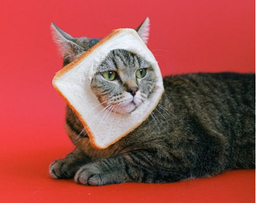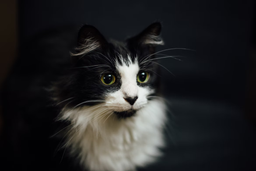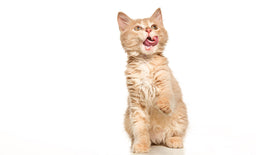British Shorthair kitten food—which products fit the bill?
Getting a British Shorthair kitten is like having an animated plush toy follow you around—it’s pure bliss! To ensure your little BSH enjoys their kittenhood, you must pay special attention to their diet.
The market is flooded with British Shorthair kitten food products claiming to provide complete nutrition, but most of them are high-carb biscuits made with harsh fillers. This breed is predisposed to obesity, feline diabetes, and gastrointestinal issues, so feeding them dry food every day is not a good idea.
Nutritionists recommend giving British Shorthair kittens high-protein wet food with lean meat tailored for optimised growth and development.
Our guide explains how to:
- Choose appropriate cat food for BSH younglings
- Plan a feeding schedule
- Recognise food allergies and intolerances in kittens
Choosing the right cat food for BSH kittens
British Shorthairs may look rounded because of their cobby physique and dense coat, but don’t mistake them for chubby kitties. Even as kittens, they have toned muscles and a low body fat percentage.
Many BSH kitties gain excessive weight as they grow up because of an imbalanced diet (and partly because they’re a wee bit lazy). If you feed them suitable food from kittenhood, they’ll stay lean and healthy despite their infamous laidback lifestyle.
A nutritious diet for British Shorthair kittens should have:
- More than 50% animal protein—Felines are carnivores by nature and need animal protein to thrive, irrespective of breed or age. If British Shorthair kittens have protein-rich meals, they automatically develop a robust constitution with appropriate muscle tone and bone density. Kitties who don’t get enough protein can:
- Become underweight
- Have delayed growth of permanent teeth
- Experience premature loss of fur
- Throw up hairballs frequently
- Up to 20% fats—Cats only need a small amount of animal fat and lipids in their diet to regulate organ function and maintain coat health. Too much fat can make your furry friend overweight. Lean protein sources like chicken, duck, turkey, salmon, and tuna work better for this breed than high-fat ones, such as beef, lamb, pork, and eggs
- Less than 3% carbs—A cat’s natural diet includes raw meat and bones, which contain almost no carbohydrates. This dietary principle should also apply to commercial cat food, but most kitten food formulas contain too many carbs. British Shorthair kittens and adults have a hard time digesting high-carb meals
What can the wrong kitten food do to your BSH?
Feeding any kitty a subpar diet (biscuits or poor-quality wet food) compromises their long-term welfare. British Shorthair kittens on a dry food diet may have the following issues:
- Kibble addiction—Cats are sensitive creatures who find comfort in familiarity. Kittens who have only had biscuit meals may feel confused and insecure when given healthy wet food and consequently reject it
- Dehydration—Felines are not avid drinkers, and dry food can cause dehydration, entailing the following conditions:
- Constipation
- Irritable bowel syndrome
- Bladder crystals
- Chronic kidney disease (usually occurs in old age)
- Stomach sensitivity—Biscuits have a coarse texture and hard-to-digest carbs that sensitise a kitty’s tummy over time. If your British Shorthair kitten has a sensitive stomach and gets diarrhoea rather easily, switch them to wet food immediately
- Gorging—It’s common for BSH kittens to overeat dry food because of its low nutritional value
One would think getting wet food would solve all problems, but that’s not true. While wet food does prevent dehydration, a low-quality product can trigger vomiting and diarrhoea in kittens due to ingredients with poor digestibility, such as:
The best wet food for British Shorthair kittens should be grain-free and made with real meat.

British Shorthairs are prone to tummy troubles. Don’t let carbs and fillers disrupt your kitty’s happy-go-lucky days.
Source: uschi2807
Can you feed adult cat food to British Shorthair kittens?
Kittens can eat adult food as long as it’s complete and balanced, but low-quality products can stress their fragile tummies.
Cats don’t need age-appropriate food if their meals contain nutritious whole meat, fish, and organs. The primary difference between “kitten food” and “adult food” is the carb content.
Kittens need a high-calorie diet till they achieve their ideal adult weight. Manufacturers use it as an excuse to pack kitten food with carbohydrates and make it calorie-dense, but that is not the optimal solution. Ideally, both kittens and adults should get their daily calories from animal protein and fat, not carbohydrates.
Untamed is dependable food for British Shorthair kittens and adults
The good life begins with great food, and if you want to introduce your British Shorthair kitty to the best, get them Untamed. We offer steamed gravy and jelly products, gentle on the tummy and easy to digest. Our meals are made with human-grade whole meat with all essential micronutrients like taurine and vitamin E. Fillers like plant proteins, meat derivatives, grains, and sugar have no place in our recipes.

Our balanced dishes pack the yumminess that makes kitties drool over and over!
Image (c) Untamed
Untamed products are designed by vets to support your kitty's health regardless of their breed or life stage. Our meals are:
- High in protein—With over 60% whole meat, proteins dominate our food. We provide twice more of this nutrient than most store-bought products. British Shorthair kitties on Untamed have the coat and physique you’d brag about!
- Balanced—Our complete food contains all nutrients necessary for growth and upkeep
- Allergen-free—Our products are free from common allergens and chemical additives. We also offer single-protein meals (Chocka Chicken and Tuck-in Tuna) for delicate kitties prone to allergies
- Lip-smacking—Untamed meals were sampled by the fussiest kitties, and they approved! The meat we use is always fresh, tender, and aromatic. Your furry friend can choose among:
Take our TRY NOW quiz and tell us all about your kitty—you can customise a meal plan and order a trial pack at the best price!

Our menu is versatile! Which Untamed can would your kitty fancy? We’re curious…!
Image (c) Untamed
How our formulas strengthen young and old kitties every day
Once you get your kitten on Untamed, we’ll have their back for life. Our products are ideal for:
- Muscle development—Kittens on Untamed develop lean muscles thanks to the top-notch proteins in our meals. If you are dealing with a malnourished adult or a scrawny senior, our food can help them gain healthy weight
- Weight management—Inactive breeds like British Shorthairs and Persians mostly stay indoors and tend to pile on pounds quickly. With the right portions, Untamed can help dieting felines stay fit and active!
- Gastrointestinal health—Kittens and seniors often throw up meals with low digestibility. Untamed dishes soothe stressed tummies and support nutrient absorption
- Recuperation—Our meals are suitable for felines suffering from common conditions like diabetes, hyperthyroidism, UTIs, arthritis, and cystitis
The feedback from our clients has helped us sketch out a timeline of Untamed benefits:
|
Timeline |
The Untamed effect |
|
1 week |
|
|
2 months |
|
|
4 months |
|
|
For life |
|
Cat-food shopping is easy with our free home deliveries!
If shopping for pet food takes up a lot of your time, let us simplify the chore for you! We deliver to your doorstep (with zero shipping charge) and can do so every month to ensure you’re stocked with fresh Untamed supplies. Modify, cancel, or postpone the delivery at your convenience!
Ordering our cat food trial pack online is child’s play. All you need to do is:
- Take our TRY NOW quiz
- Select what you like
- Place the order
Untamed stands by the values of ethical cat food. We are Carbon Neutral Certified, and our planet pledge entails:
- Using 100% recyclable packaging for all cat food deliveries
- Getting meat from cruelty-free suppliers
- Acquiring seafood from sustainable and dolphin-safe sources

Untamed keeps kitties strong and the environment safe—aren’t we going to try this, hooman?
Image (c) Untamed
What about alternate diets for BSHs?
Alternative diets for British Shorthairs include raw and homemade food, which are unsafe compared to wet food. Here’s why:
- Raw food—Even if you get raw chicken or tuna from a trusted supplier, there’s always a risk of pathogen contamination during handling. Feeding raw food to British Shorthair kittens can cause food poisoning and diarrhoea, which can turn fatal
- Homemade meals—Preparing homemade cat food comes with the following risks:
- Adding harmful ingredients (onions, green tomatoes, milk, etc.)
- Overseasoning meals
- Triggering a nutritional imbalance
British Shorthair kitten feeding guide
Once you get the perfect food for your kitty, focus on creating an effective feeding schedule. Here’s a sample meal plan for a British Shorthair kitten:
|
Status |
What to feed |
How to feed |
|
Infant |
|
|
|
During weaning |
|
|
|
On solids |
|
|
If your kitty doesn’t need an entire can of wet food in a single serving, seal and store it in a refrigerator. Warm the meal to room temperature before the next serving.
Remember that this is a suggested plan only. You should adjust the portions and frequency according to your kitty’s individual development needs. Consult a vet for precise recommendations.
Once your BSH kitty hits their adult size (when they weigh around 3 kilos), feed them between 150–250 grams of wet food every day, distributed across 2–3 meals, depending on their activity levels. Neutered BSHs aren’t big on exercise and usually feel full on two meals a day.
How to detect food allergies and intolerances in kittens early on
Certain foods may not sit well with British Shorthairs. Many BSHs cannot handle beef, cow’s milk, or dairy products like cheese.
Watch out for symptoms of food allergy or intolerance in cats for at least 12 hours after feeding any new food or snack. The symptoms include:
- Vomiting, regurgitation, or diarrhoea
- Wheezing
- Itchy skin
- Red eyes
- Retching
- No appetite
Once you recognise possible allergens, keep the problematic ingredients off the table.

![Best food for Ragdoll cats in the UK [Broken Down]](http://untamed.com/cdn/shop/articles/featured_best_food_for_ragdoll_cats_uk.jpg?v=1646818249&width=256)

